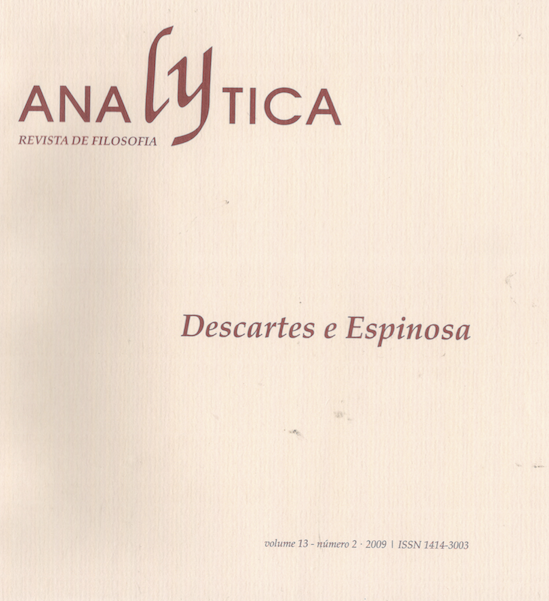Sensação e conhecimento da existência do corpo nas Meditações de Descartes
Palavras-chave:
, Descartes, cognição sensível, idéia, existência do corpo, tese da semelhança, identidade estrutural, sensory cognition, ideas, existence of bodyResumo
O artigo examina duas maneiras como as concepções do sujeito meditante acerca da cognição sensível evoluem ao longo das Meditações, e procura argumentar que em cada caso a mudança é menos radical do que se poderia pensar. A primeira maneira diz respeito à necessidade de oferecer um argumento satisfatório para a existência do corpo. O artigo mostra que nem esta necessidade nem o argumento indicam um compromisso com a tese de que nossa cognição sensível termina nas idéias e não nas coisas corporais. Ou seja, Descartes não defende uma concepção que o compromete com um véu de idéias. A segunda maneira diz respeito à rejeição da tese de que a cognição sensível envolve semelhança. O artigo mostra que essa rejeição não significa que Descartes abandone uma descrição da cognição sensível em termos de estrutura partilhada substituindo-a por uma mera covariância causal. O que Descartes procura fazer é solicitar uma certa latitude na interpretação da "semelhança", latitude esta suficiente para que a realidade que percebemos sensivelmente possa existir em nossas mentes "obscuramente" e "confusamente", e também para que não tentemos apreender a metafísica básica das qualidades sensíveis a partir de nossas idéias sensíveis e acabemos comprometidos com a concepção de quente e frio, ou branco e verde, como realidades primitivas.
Abstract
In this paper, I have traced two ways in which the meditator's views on the senses evolve over the course of the Meditations, and I've argued that in each case the shift is less radical than one might have thought. First, the meditator comes to appreciate the need for an argument for the existence of body and find an argument that remedies that lack. The paper shows that neither the need nor the argument bespeaks a commitment to a veil of ideas; neither shows a commitment to the thesis that our sensory cognition terminates at ideas rather than in corporeal things. Second, the meditator comes to reject the resemblance thesis. The paper shows that this does not mean that the meditator throws over a picture of sensory cognition drawn in terms of shared structure in favor of mere causal covariance. Rather, what Descartes is really doing is asking for a certain amount of latitude in how we construe the "resemblance"—i.e., enough latitude so that the reality that we sense can exist in our minds "obscurely" and "confusedly" and enough so that we don't find ourselves trying to read the basic metaphysics of sensory qualities off from our sensory ideas and wind up committed to hot and cold or white and green as primitive realities.
Recebido em 08/2009
Aprovado em 10/2009
Downloads
Downloads
Publicado
Como Citar
Edição
Seção
Licença
Os autores que publicam nesta revista concordam com os seguintes termos:
- Os autores mantêm os direitos autorais e concedem à revista o direito de primeira publicação, com o trabalho simultaneamente licenciado sob a Licença Creative Commons Atribuição-SemDerivações 4.0 Internacional (CC BY-ND 4.0), que permite a redistribuição, comercial ou não comercial, desde que a obra original não seja modificada e que seja atribuído o crédito ao autor.
- Os autores têm autorização para assumir contratos adicionais separadamente para distribuição não-exclusiva da versão do trabalho publicada nesta revista (ex.: publicar em repositório institucional ou como capítulo de livro), com reconhecimento de autoria e publicação inicial nesta revista.
- Os autores têm permissão e são estimulados a publicar e distribuir seu trabalho online (ex.: em repositórios institucionais ou na sua página pessoal) a qualquer ponto antes ou durante o processo editorial, já que isso pode gerar alterações produtivas, bem como aumentar o impacto e a citação do trabalho publicado (Veja O Efeito do Acesso Livre).


